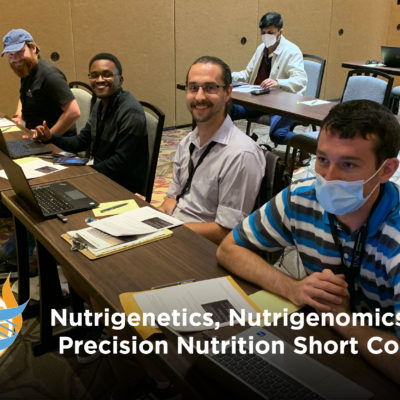The NRI presented its annual NGx short course May 16-19, in Concord, NC, for graduate students, health professionals, and nutrition scientists. See recap of Day One.
On Day Two of the short course, attendees heard from experts on using nutrigenetics, nutrigenomics, and precision nutrition (NGx) for studying health and disease.
Cory Brouwer, PhD, director of the Bioinformatics Services Division, UNC Charlotte, presented “Experimental Approaches in Nutrigenetics,” discussing the importance of bioinformatics in research. Bioinformatics is the use of computer science, mathematics, and information theory to organize and analyze complex biological data, especially genetic data. Offering examples of experiments and their use of this technology, Brouwer explained that bioinformatic tools aid in the comparison of genetic and genomic data. At a more integrative level, bioinformatics helps analyze and catalogue the biological pathways and networks that are an important part of systems biology.
Susan Smith, PhD, deputy director for science and professor of nutrition, UNC Nutrition Research Institute, spoke on “Using Nutrigenetics to Study Nutrient Requirements.” She discussed how people are metabolically different, explaining that while we tend to assume most people are average, the fact is that we differ widely in nutrient requirements and responses. Smith provided examples of studies that show this, including one on choline that produced marked results. Choline is an essential nutrient, yet most Americans do not achieve an adequate intake. Dietary requirements differ by gender and age and life stage. In a clear example of how nutrient requirements can vary, choline deficiency presents itself differently from person to person. For example, some people may develop fatty liver while others may develop muscle damage or anxiety.
Speaking on NGx as a tool in disease management, Stephen Hursting, PhD, MPH, director and professor of nutrition, UNC Nutrition Research Institute, presented “Identifying New Targets and Strategies for Cancer Prevention and Therapy,” illustrating the connections between cancer and nutrition. From the impact of obesity to the bioactive components in food, nutrition and cancer have a complicated relationship. Hursting explained in detail his work on obesity and cancer (read more here).
Susan Sumner, PhD, professor of nutrition, UNC Nutrition Research Institute, uses metabolomic technologies to measure tens of thousands of small molecules (metabolites) to better understand how nutrition affects metabolism, performance, and health. In her presentation, “Metabolomics, the Exposome, and Precision Health,” she explored the relationship between precision medicine and precision nutrition. In precision medicine, we study how some individuals respond well to a drug treatment, while others do not have a positive response. In precision nutrition, we study individuals’ differing nutrient requirements and their differing responses to nutrient intake. Individuals’ varying exposures through dietary intake, supplements, and natural products, as well as lifestyles, environment, and states of health all contribute to metabolic individuality.
In the afternoon, workshop participants toured the UNC Nutrition Research Institute, visiting the lab of Isis Trujillo, PhD, assistant professor of nutrition, and the Human Research Core with its many tools for research and evaluation, including a whole-room calorimeter or metabolic chamber.
The NGx short course educates current and future NGx researchers, provides cutting-edge research directions and methodologies in NGx, and brings together students, postdocs, faculty (basic scientists and translational researchers), industry researchers, and clinicians in an inclusive environment to foster interactions and networking.

